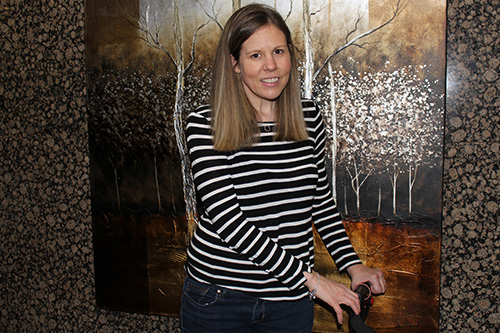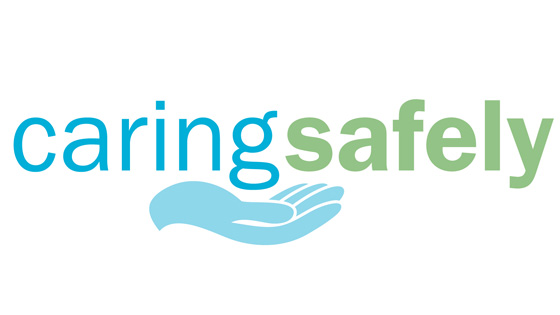
Katie Dick says she learned through her patient experience in 2010 how important it is to feel that staff are listening to you. (Photo: UHN)
It's been more than five years, but Katie Dick still vividly remembers the calming actions – the hand on the shoulder, the constant eye contact, words that offered reassurance but no promises.
It was late 2010 when Katie had spinal surgery at Toronto Western Hospital. After three days in the Intensive Care Unit, she was moved to another floor to continue recovery, where her surgeon said to be particularly careful to not let anyone touch or move the tube draining spinal fluid from her back.
But within 24 hours of that warning, Katie endured a frightening incident she was sure would mean another surgery. Despite her repeated warnings to her nurse to be careful of the drain, it was dislodged.
"The way she was working, I felt like she wasn't listening to me," Katie recalls of the nurse initially caring for her that day. "She moved me, there was a yank and I rolled onto the tube."
Moments after the nurse left, Katie's worst fears were realized: "My bed was soaked. I freaked out."
A different nurse was soon by her side, says Katie, who described herself as "really panicky, losing it."
'I was her No. 1 priority'
The new nurse first contacted medical staff from Neurology, asking someone to come to the room. Then, she focused on Katie.
"She spent the entire time with me. I was her No. 1 priority," Katie recalls of a period that was only 10 to 20 minutes but seemed an eternity. "She maintained constant eye contact, giving me something to focus on. She put her hand on my shoulder and that physical contact was calming and reassuring.
"She never said 'Everything will be okay' but she made it clear she was dealing with the situation, which I appreciated more than anything. She was reading me, listening to me. I was all that mattered to her."
Related to this story
Neurology doctors arrived and assessed Katie. The tube had been pulled and did leak but they came up with a solution that could be achieved at the bedside. A second surgery was not going to be required.
Although "everything ended up being fine," Katie, who is now a member of the UHN Patient Partner Program, feels compelled to tell her story. It's about the importance of inter-personal relationships between staff and patients, and she believes it offers valuable lessons for Caring Safely, the patient and workplace safety transformation launched by President and CEO, Dr. Peter Pisters, last June.
Challenge issued by Dr. Pisters
Dr. Pisters used his first UHN Annual General Meeting to call for a national discussion on medical errors and preventable harm of patients, and on workplace safety incidents, with an eye to their elimination.
Since issuing that challenge to staff – and the entire Canadian healthcare sector – much has happened.
Daily safety huddles are happening at all UHN sites and on many units. There is a growing understanding of the principles of High Reliability Organizations such as a commitment to zero preventable harm, and a recognition we must all anticipate problems and make the assumption that failure will happen. Hard work continues on building a just culture which looks at failure without shame or blame.

The new Caring Safely logo is being shared between SickKids and UHN.
Along the way, there have been a number of milestones, including the adoption of safety concepts at the senior management and Board level, the establishment of partnerships in Caring Safely with area healthcare providers SickKids, Women's College and Mount Sinai, and the gathering of information from American hospitals which have been on this journey for many years.
A Caring Safely Steering Committee and a Transformation Team have been created featuring representation from across UHN. Six Hospital Acquired Conditions (HACs) for the initial focus have been finalized, as have three priority areas to reduce harm in the workplace. Results from last fall's
Speak up for Safety Survey among staff throughout the organization are now rolling out.
A key aspect of the Caring Safely mandate is a commitment to engaging patients and their caregivers. The Transformation Team includes a Patient Partner and they will help shape how UHN becomes a safer and more compassionate environment for patients, their caregivers and staff.
New intranet site coming soon
Much work has been done in the area of education in terms of developing curriculum and criteria for faculty selection for training courses. Curriculum is expected to be finalized by September and, given the size of UHN, it will take approximately two years for everyone to complete core safety training.
Today, marks another milestone. UHN is introducing a Caring Safely logo, which is being shared with SickKids as part of a Memorandum of Understanding between the two hospitals. Soon, there will also be a new staff intranet site, which will serve as a great resource for those looking for more information.
Katie Dick doesn't recall ever again seeing either of the nurses who cared for her that day more than five years ago. And, she's certain she never spoke to them about what happened or how she felt about it.
'Listen to the patient'
Asked what she'd say to each nurse if she could, Katie pauses, reflects and says something she believes is not just relevant to both nurses but all other hospital staff: "Listen to the patient."
"I'm sure she had a million things to do that day," Katie says of the first nurse caring for her. "But I just felt that she was rushed and didn't want to take the time to listen to me.
"I think the most important thing is making the patient feel like they are being listened to because then they have the confidence that they've been heard and that helps make them feel safer."
Of the second nurse that day, Katie says "she had the wherewithal to read me well" and that was key.
"In a situation where I was very stressed and didn't feel particularly safe, she turned that around and reassured me," Katie says. "I appreciated feeling like I was her No. 1 priority.
"As a patient at UHN, you just assume that the level of care you're going to get is high. But it's the interaction with the staff members that make a visit stressful or not."
